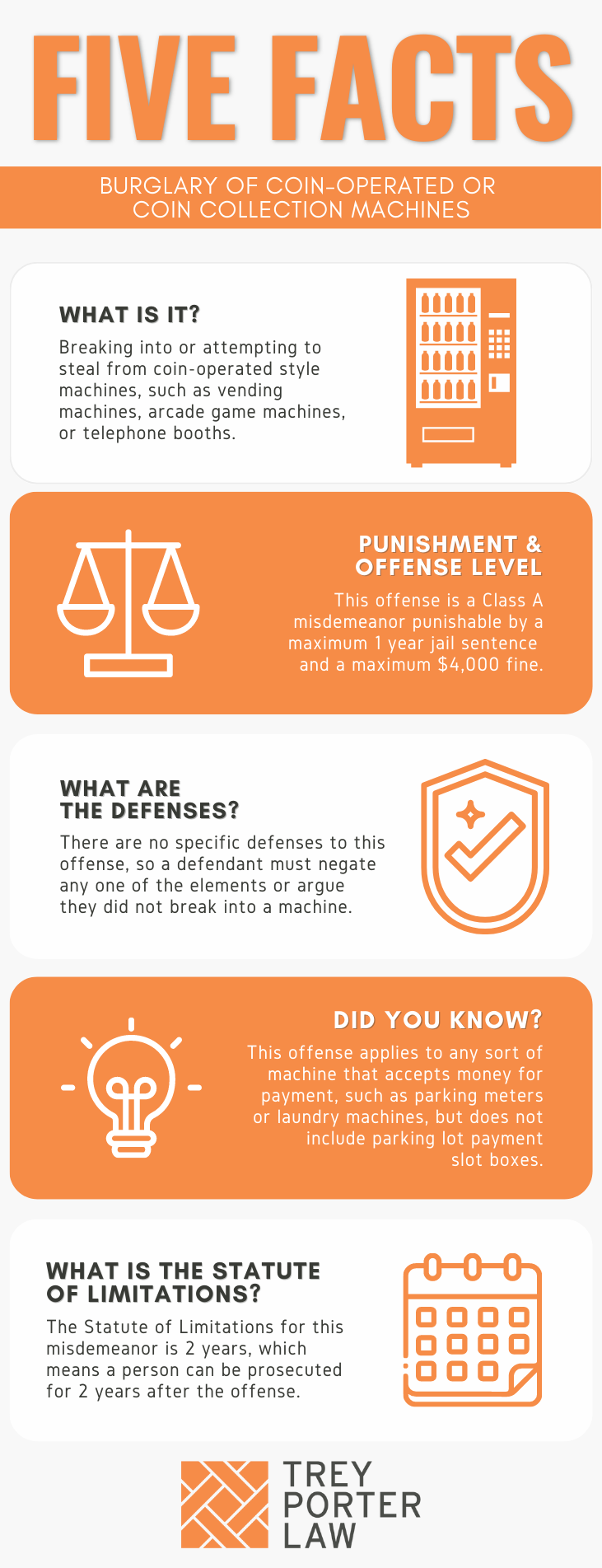WHAT IS BURGLARY OF COIN-OPERATED OR COIN COLLECTION MACHINES IN TEXAS?
Burglary of a coin-operated or coin collection machine is stealing or attempting to steal from any machine or receptacle that accepts money for goods or services.

WHAT IS THE BURGLARY OF COIN-OPERATED OR COIN COLLECTION MACHINES LAW IN TEXAS?
Tex. Penal Code § 30.03. BURGLARY OF COIN-OPERATED OR COIN COLLECTION MACHINES.
(a) A person commits an offense if, without the effective consent of the owner, he breaks or enters into any coin-operated machine, coin collection machine, or other coin-operated or coin collection receptacle, contrivance, apparatus, or equipment used for the purpose of providing lawful amusement, sales of goods, services, or other valuable things, or telecommunications with intent to obtain property or services.
(c) An offense under this section is a Class A misdemeanor.
WHAT IS THE PENALTY CLASS FOR BURGLARY OF COIN-OPERATED OR COIN COLLECTION MACHINES IN TEXAS?
Burglary of coin-operated or coin collection machines is a Class A misdemeanor, punishable by up to one year in county jail.
WHAT IS THE PUNISHMENT RANGE FOR BURGLARY OF COIN-OPERATED OR COIN COLLECTION MACHINES IN TEXAS?
Burglary of a coin-operated or coin collection machine, a Class A misdemeanor, carries a possible year in jail, and a maximum fine of $4,000. The minimum confinement is increased to 180 days in jail if a person burglarizes a coin-operated or coin collection machine during a time and in an area subject to an emergency evacuation order, or under a declaration of a state of disaster by the governor or president of the United States. See Tex. Penal Code § 12.50.
WHAT ARE THE PENALTIES FOR BURGLARY OF COIN-OPERATED OR COIN COLLECTION MACHINES IN TEXAS?
As an alternative to jail time, a person may be placed on probation after a conviction, or deferred adjudication without a conviction, for a period of up to two years.
WHAT ARE THE DEFENSES TO BURGLARY OF COIN-OPERATED OR COIN COLLECTION MACHINES IN TEXAS?
The statute does not authorize specific defenses to burglary of a coin-operated or coin collection machine, so a person on trial for burglary of a coin-operated or coin collection machine may raise any defense in an attempt to negate an element of the offense.
- What is a coin-operated or coin collection machine? A coin-operated or coin collection machine includes any type of vending machine, parking meters, laundry machines, and so on. But a parking lot payment slot box has been rejected as a “machine.” See Morris v. State, 928 S.W.3d 282 (Tex. App.—Fort Worth 1996, no pet.).
- What is breaking and entering? For burglary cases requiring a “break or enter,” any intrusion into the protected enclosure constitutes an entry. For example, a defendant was caught forcing a laundry machine cash box open with a crowbar. But he fled without successfully opening the box. At trial, and on appeal after he was convicted, he argued he did not enter the cash box. However, the appellate court held that “entry” simply means “breaking of the close.” If an object connected to the body intrudes into the protected premises. Here, the tool the defendant used “broke the close.” Shrader v. State, No. 03-08-00356-CR (Tex. App.—Austin Nov. 10, 2009, no pet.).
WHAT IS THE STATUTE OF LIMITATIONS FOR BURGLARY OF COIN-OPERATED OR COIN COLLECTION MACHINES IN TEXAS?
The limitation period for burglary of a coin-operated or coin collection machine, a Class A misdemeanor, is two years.
BURGLARY OF COIN-OPERATED OR COIN COLLECTION MACHINES IN TEXAS
Burglary of a coin-operated or coin collection machine is breaking into any coin-operated or coin collection machine, or attempting to break in without succeeding. The law requires a “break or enter,” which is satisfied if the person used only the slightest force to break the close. It does not require a showing of damage or destruction to the property.
TEXAS BURGLARY OF COIN-OPERATED OR COIN COLLECTION MACHINES COURT CASES
The case law regarding burglary of coin-operated or coin collection machines in Texas illustrates the statute’s application.
In Morris v. State, the defendant was convicted of burglarizing a coin collection machine after stealing money from a parking lot payment slot box. At trial, and on appeal after conviction, the defendant argued the payment box for a paid parking lot was not a “machine.” The appellate court agreed, even though the statute outlaws burglarizing a “coin collection receptacle.” Due to the lack of electronics or mechanisms, the court held there was no evidence the payment box was “coin-operated” within the meaning of the statute. Conviction reversed. 928 S.W.3d 282 (Tex. App.—Fort Worth 1996, no pet.).
















